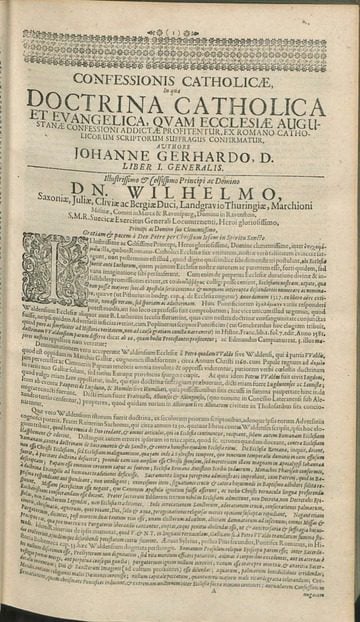
*****
Since they demonstrate the uncertainty of the very papal dogma that we are attacking, they thereby confirm our opinion opposed to the same papal dogma. But since those differences argue the uncertainty of papal dogmas, the matter itself is proved, and can be confirmed in detail from Bellarmine himself. For he, in Book 4. On the Eucharist, Chapter 23, Prop. 4, forms the following proposition: “No spiritual fruit is taken from two kinds, which is not taken from one”; he adds: “this proposition is not at all certain, since theologians think variously about it, nor does the Council openly define it.” Therefore, transferring the hypothesis to the theory, we can say that those statements, about which theologians variously argue, either before or after the definition of the Council of Trent, are not really certain, and therefore those differences of theologians and pontiffs are not to be rendered by the papal dogmas, which confirm our opinion opposed to them.
He’s either citing St. Robert Bellarmine out of context or erroneously or interprets him wrongly, since Trent was clear on this point. In its 21st session in 1562, in the Decree on Communion Under Both Species, chapter 3, it stated:
That Christ whole and entire, and a true Sacrament are received under either species.
It moreover declares, that although, as hath been already said, our Redeemer, in that last supper, instituted, and delivered to the apostles, this sacrament in two species, yet is to be acknowledged, that Christ whole and entire and a true sacrament are received under either species alone; and that therefore, as regards the fruit thereof, they, who receive one species alone, are not defrauded of any grace necessary to salvation. (my italics and bolding; Denzinger 1729; p. 415 in the 43rd edition, 2012)
Moreover, in its session 13 in October 1551, the Council had also declared in the Decree on the Sacrament of the Eucharist:
Wherefore it is most true, that as much is contained under either species as under both; for Christ whole and entire is under the species of bread, and under any part whatsoever of that species; likewise the whole (Christ) is under the species of wine, and under the parts thereof. (Chapter 3; Denzinger 1641, p. 394)*If any one denieth, that, in the venerable sacrament of the Eucharist, the whole Christ is contained under each species, and under every part of each species, when separated; let him be anathema. (Canon 3; Denzinger 1653, p. 397)
The whole Christ is contained under the species of bread and the whole Christ under the species of wine. Further, the whole Christ is present under any part of the consecrated host or the consecrated wine when separated from the rest. (Denzinger 1321, p. 341)
*
Matthew 7:3-5 Why do you see the speck that is in your brother’s eye, but do not notice the log that is in your own eye? [4] Or how can you say to your brother, ‘Let me take the speck out of your eye,’ when there is the log in your own eye? [5] You hypocrite, first take the log out of your own eye, and then you will see clearly to take the speck out of your brother’s eye.
The beginning of the truly Catholic religion is this, that the word of God, contained in the prophetic and apostolic writings, should perfectly inform us of all things necessary for faith, and consequently be the only norm and rule of all controversies of faith which are discussed in the Church. Therefore, the first principle is that Scripture is perfect. For example, 1. By the praise of perfection attributed to Scripture, we understand this, that it fully and perfectly informs us of all things which are necessary for faith and morals. 2. We do not call Scripture perfect because all things which are necessary for faith and morals are contained in the Scriptures in a large number of letters and in as many words, but we say that some are contained explicitly, some implicitly in them, so that they can be deduced from them by legitimate and immutable confluence.
He offers a fairly standard definition of sola Scriptura: the historically novel and unbiblical Protestant rule of faith.
Rev. 22. v. 18. & 19. wherefore the Apostle warns, that no one should do more than what is written 1. Cor. 4. v. 6.
Revelation 22:18-19 I warn every one who hears the words of the prophecy of this book: if any one adds to them, God will add to him the plagues described in this book, [19] and if any one takes away from the words of the book of this prophecy, God will take away his share in the tree of life and in the holy city, which are described in this book.
This has nothing do do with the question of whether legitimate unwritten traditions exist. It simply warns about adding to or taking anything away from the one book of Revelation. Once we enter into Protestant defenses of sola Scriptura, non sequiturs are ubiquitous. They never cease to amaze me, in their wrongheadedness and argumentative bankruptcy. I’ve already dealt with the failure of 1 Corinthians 4:6 as an alleged prooftext, so it need not detain us any further.
From a perfect voluntary cause, willing and not hindered to produce a perfect effect, a perfect effect proceeds. Such is the cause of Scripture, since He willed that the Scriptures should be written and come forth for that end, that from His own power and will they should fully lead us to faith, and no impediment to the production of this effect intervenes or could intervene.
This is clearly untrue (and equally as clearly, silly), and it is because human free will can and does interfere with God’s will for His inspired Scripture. Hence St. Peter wrote about St. Paul’s writings: “There are some things in them hard to understand, which the ignorant and unstable twist to their own destruction, as they do the other scriptures” (2 Pet 3:16). And Paul refers to those who “will not endure sound teaching, but having itching ears they will accumulate for themselves teachers to suit their own likings, and will turn away from listening to the truth and wander into myths” (2 Tim 4:3-4).
Thus, the perfect effect” of the truth of Scripture is and always can be prevented by willful human obstinacy and pride. A perfect Scripture doesn’t guarantee that all will accept and understand and follow this perfect Scripture and come to total agreement because God wills that. Any three-second pondering of Protestant division proves this.
Rom. 1:1-2, explains all the parts of Christianity, so that from it we may have faith in Christ and the doctrine of good works.
It does no such thing:
Romans 1:1-2 Paul, a servant of Jesus Christ, called to be an apostle, set apart for the gospel of God [2] which he promised beforehand through his prophets in the holy scriptures,
This refers only to the gospel. St. Paul defines the gospel in Acts 13:30-33 as the resurrection of Jesus and as His death, burial, and resurrection in 1 Corinthians 15:1-8. Therefore, Romans 1:1-2 does not explain “all the parts of Christianity.”
nothing should be added or taken away, Deuteronomy. 4. v. 2. chap. 12. v.32. (which is to be understood of the word written is evident from Deuteronomy. 28. v. 58. & Jol. i. v. 8.) Prov. 3o. v.5. Galatians .i .v. 8.
This is the same repeated fallacy dealt with in regard to Revelation 22:18-19 above. Deuteronomy 4:2 and 12:32 teach that Scripture (at that time, the Torah, or the first five books of the Old Testament) shouldn’t be added to or subtracted from. It’s very simple. This is not the same thing as saying that “no oral tradition can also exist.” In the same book, after all (8:20-22) it’s stated that prophets speak the “word” of the Lord, “in the name of the Lord.” Such prophecies go beyond Scripture itself. Thus, Deuteronomy doesn’t prove sola Scriptura; it disproves it.
Proverbs 30:5-6 states that “Every word of God proves true . . . Do not add to his words.” It’s the same concept again. Protestants assume that “word of God” is the equivalent of “Bible.” But it’s not. It (like “word of the Lord”) also refers to God’s personal revelation to prophets: “the word of God came to Shemai’ah” (1 Kgs 12:22); “the word of God came to John the son of Zechari’ah in the wilderness” (Lk 3:2). 1 Corinthians 14:30 even refers to extra-biblical continuing new covenant prophecy as “revelation.”
Galatians 1:18 is about false gospels, not about whether Scripture is the only infallible rule of faith. It gets very wearisome having to point out these obvious things. But it happens in every discussion about sola Scriptura because Protestants have no genuine biblical proof of it at all, let alone compelling ones. So instead we get irrelevant nonsense such as the above, even (the most amazing thing) from brilliant minds and scholars like Gerhard.
*
Practical Matters: I run the most comprehensive “one-stop” Catholic apologetics site: rated #1 for Christian sites by leading AI tool, ChatGPT — endorsed by popular Protestant blogger Adrian Warnock. Perhaps some of my 5,000+ free online articles or fifty-six books have helped you (by God’s grace) to decide to become Catholic or to return to the Church, or better understand some doctrines and why we believe them.
*
***
*
Photo credit: 1679 edition of Gerhard’s Confessio Catholica (Frankfurt) [public domain / Internet Archive]
Summary: Second of two replies to the “Confessio” of Lutheran theologian Johann Gerhard (1582-1637), in which he sought to confirm Lutheran doctrines by various Catholic statements.













